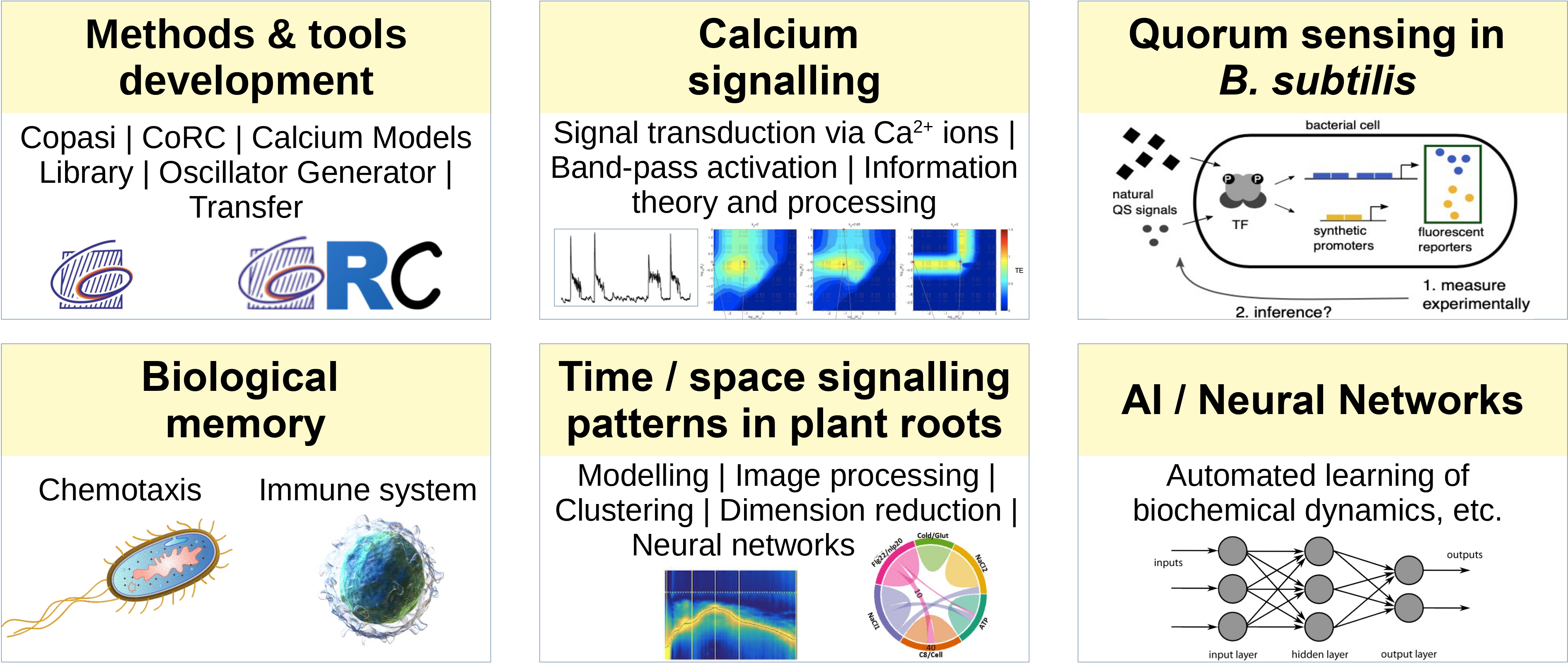Biological Information Processing
Dr. Jürgen Pahle
We specialize in deciphering how living systems process and transfer information. Our focus lies in analyzing how living systems take up, process, store, and transfer information, pursued through various avenues. Firstly, we construct kinetic models to understand biological systems' dynamics, such as the modulation of oscillations in the second messenger Ca2+ and their regulatory effects on downstream proteins. We delve into the reliability of these systems by incorporating stochastic simulations to account for intrinsic fluctuations in particle numbers. Secondly, we integrate concepts from information theory and AI/machine learning to explore biological memory's role in systems like E. coli chemotaxis and the adaptive immune system, examining how memory impacts system functionality. Lastly, method development is a key aspect of our work, involving extensions to widely-used software like COPASI for biochemical systems modeling and the creation of tools like CoRC for facilitating systems biology workflows within the R programming environment.
Research Strategy
The main aim of our research is to analyze how living systems take up, process, store, and transfer information. To achieve this aim, we are active in different areas. First, we are building (kinetic) models of biological systems, for instance, models that describe how oscillations in the second messenger Ca2+ arise, how they are modulated, and how these dynamics lead to specific regulation of different downstream calcium-dependent proteins. We investigate how reliable these systems are by explicitly considering intrinsic fluctuations in particle numbers and utilizing stochastic simulation methods.
Second, we adapt and apply ideas from information theory and AI/machine learning to address biological research questions. For instance, we study how biological memory is employed in E. coli chemotaxis or the adaptive immune system, and how this effects the functioning of these systems. Third, we are working on method development. This includes extending the widely-used software COPASI for the modelling and simulation of biochemical systems as part of the COPASI developer team, or the development of packages for the R programming environment that allows users to set up systems biology workflows, such as CoRC.


Dr. Jürgen Pahle
- +49 (0)6221 54-51357
- juergen.pahle@bioquant.uni-heidelberg.de
- Find more information here
Selected Publications
Jonas Förster, Frank T. Bergmann & Jürgen Pahle
Bioinformatics, Volume 37, Issue 17, September 2021, Pages 2778–2779
Mechanistic Modeling and Multiscale Applications for Precision Medicine: Theory and Practice
Egils Stalidzans, Massimiliano Zanin, Paolo Tieri, Filippo Castiglione, Annikka Polster, Stefan Scheiner, Jürgen Pahle, Blaž Stres, Markus List, Jan Baumbach, Manuela Lautizi, Kristel Van Steen & Harald H.H.W. Schmidt
Network and Systems Medicine. 2020, Volume 3, Issue Number 1
Requirements for band-pass activation of Ca2+-sensitive proteins such as NFAT
Arne Schoch, Jürgen Pahle
Biophys Chem. 2019 Feb:245:41-52.